|
|
|
Sort Order |
|
|
|
Items / Page
|
|
|
|
|
|
|
| Srl | Item |
| 1 |
ID:
126733
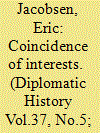

|
|
|
|
|
| Publication |
2013.
|
| Summary/Abstract |
This article will demonstrate that in 1963 the administration of President Kennedy helped create a Ba'th regime in Iraq and then provided it with assistance in order to secure U.S. interests, including access to oil and the containment of both Communism and Arab nationalism. On February 8, 1963, the Ba'th overthrew the dictatorship of General 'Abd-ul-Karim Qasim, an Iraqi nationalist who was seen by both the Eisenhower and Kennedy administrations as a threat to U.S. interests. U.S. policy makers provided the Ba'th regime with military and economic assistance, including sales of military equipment, credits for agricultural surpluses for credit under Public Law 480, and Export-Import Bank loans. Policy makers also encouraged private U.S. businesses to sign contracts with Iraq, supplied the Ba'th regime with ammunition to use against Kurdish rebels, used the Central Intelligence Agency to provide it military equipment, and ignored the Export-Import Bank's policy that prohibited financing arms sales.
|
|
|
|
|
|
|
|
|
|
|
|
|
|
|
|
| 2 |
ID:
106274
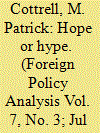

|
|
|
|
|
| Publication |
2011.
|
| Summary/Abstract |
Many foreign affairs cognoscenti agree that the United States needs to restore its standing as a legitimate world leader and recommit to international institutions in order to address the world's most pressing problems. However, these prescriptions mean relatively little without first examining what legitimate leadership entails and whether such leadership is, in fact, possible. This article proceeds in three steps. First, it discusses the meaning of legitimate leadership in the context of international institutions and underscores the enduring challenges the United States faces in this regard. Second, it highlights the domestic political impediments that ineluctably constrain the implementation of a consistent and cohesive US foreign policy. Finally, the article suggests that if the US legitimacy deficit is to some degree a fact of life, we should rethink which governance arrangements are most capable of harnessing US power for a greater good and devote increased attention to what legal scholars call "new governance."
|
|
|
|
|
|
|
|
|
|
|
|
|
|
|
|
| 3 |
ID:
130470


|
|
|
|
|
| Publication |
2014.
|
| Summary/Abstract |
Walter Russell Mead paints a disturbing portrait of the United States' geopolitical predicament. As he sees it, an increasingly formidable coalition of illiberal powers -- China, Iran, and Russia -- is determined to undo the post-Cold War settlement and the U.S.-led global order that stands behind it. Across Eurasia, he argues, these aggrieved states are bent on building spheres of influence to threaten the foundations of U.S. leadership and the global order. So the United States must rethink its optimism, including its post-Cold War belief that rising non-Western states can be persuaded to join the West and play by its rules. For Mead, the time has come to confront the threats from these increasingly dangerous geopolitical foes.
|
|
|
|
|
|
|
|
|
|
|
|
|
|
|
|
| 4 |
ID:
089911
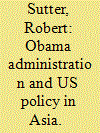

|
|
|
|
|
| Publication |
2009.
|
| Summary/Abstract |
American preoccupation with the global economic recession and conflicts in Southwest Asia and the Middle East indicated that US relations with the rest of the Asia-Pacific region were likely to be of generally secondary importance at the start of the Obama administration. In Asia, the economic crisis put a premium on close US collaboration with the major economies, China and Japan, and on avoiding egregiously selfserving economic practices that could prompt protectionism and curb world growth. Apart from the Middle East-Southwest Asian region, the other major area of US security concern in Asia was North Korea. North Korea's escalating provocations created a major international crisis in 2009 that forced the Obama government to change priorities and give top-level attention to dealing with Pyongyang. The provocations included a long range ballistic missile test, a nuclear weapons test (North Korea's second), withdrawal from the Six-Party Talks and resumption of nuclear weapons development. Longstanding US concern with the security situation in the Taiwan Straits declined as President Ma Yingjeou reversed the pro-independence agenda of his predecessor and reassured China. The Obama government seemed poised to build on and make a few needed adjustments to Bush administration policies towards regional allies and emerging powers, China and India. Early indicators suggest that enhanced US activism and flexibility in Southeast Asia may represent a significant change in US policy in Asia under an Obama administration that otherwise seems generally inclined to adhere fairly closely to pragmatic and constructive US approaches to key Asia issues in recent years.
|
|
|
|
|
|
|
|
|
|
|
|
|
|
|
|
| 5 |
ID:
124785
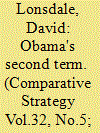

|
|
|
|
|
| Publication |
2013.
|
| Summary/Abstract |
President Obama's policy toward nuclear weapons has seriously undermined the flexibility and credibility of U.S. nuclear strategy. As a consequence of its desire to provide leadership on nuclear abolition, nuclear strategy under the Obama administration is shallow and unconvincing. This article seeks to put strategy back at the center of discourse on U.S. nuclear weapons policy. In this endeavor, and in contrast to Obama's stated stance, this article resurrects some important elements of Cold War strategic thinking on the subject. Warfighting, nuclear bargaining, and escalation dominance are particularly worthy of renewed attention.
|
|
|
|
|
|
|
|
|
|
|
|
|
|
|
|
| 6 |
ID:
160946
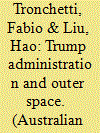

|
|
|
|
|
| Summary/Abstract |
In a relatively short period of time, the Trump administration has been fairly active in the field of space. The reconstitution of the National Space Council, under the direction of Vice President Pence, the President’s signing of Space Policy Directive 1, that calls for the return of humans to the Moon, and the announcement of a National Space Strategy that calls for an ‘America first’ approach in space, have been the highlights of this process. A key component of the administration’s approach has been the promotion of commercial (private) space activities through an effort of regulatory reform intended to facilitate free enterprise and individual initiative in space.
Overall, it is evident that the Trump administration views a consolidated US leadership in space as instrumental to ‘Make America Great Again’. However, due to the lack of cohesion in the management of the US space program, the controversial interpretation of international principles and the US-centred view of space endorsed by the administration, doubts remain as to whether the space policy of the Trump administration will foster US leadership in space or lead to its progressive isolation.
|
|
|
|
|
|
|
|
|
|
|
|
|
|
|
|
| 7 |
ID:
117355
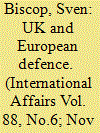

|
|
|
|
|
| Publication |
2012.
|
| Summary/Abstract |
The UK, with France, initiated the European, today Common, Security and Defence Policy (ESDP/CSDP) in 1998-9. A strong consensus on the need to address capability shortfalls, which the UK accepted to attempt under the EU flag, however masked the lack of consensus about the extent to which the EU would also make policy and launch operations (which would require permanent planning and conduct structures). This debate about the degree of EU autonomy vis-à-vis NATO and the US is one of the reasons why Europeans collectively have no strategic vision on the regions and scenarios for which they should assume responsibility, as the Libyan crisis demonstrated. But also on the capability side, the UK in the end never fully committed, withholding the necessary budget to allow the European Defence Agency to operate as intended and resisting moves towards military integration, such as Permanent Structured Cooperation, in favour of bilateral arrangements such as the 2010 agreement with France. Meanwhile, however, the US came to demand that Europe take charge, autonomously, of crisis management in its own neighbourhood. British policy now seems to have struck a dead end. London has managed to slow down the CSDP. NATO has seen even fewer results in capability development, but when it comes to operations, in the absence of US leadership NATO is equally blocked by the lack of a collective European strategic vision. London, with Paris, remains the only European actor able and willing to engage in crisis management and war, but cannot mobilize many other capitals to join in. Unlike the US, the UK does not have the means to go in alone if necessary. A fundamental revision of policy is needed if the UK wants to maintain its level of influence in security and defence.
|
|
|
|
|
|
|
|
|
|
|
|
|
|
|
|
|
|
|
|
|